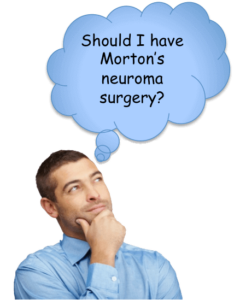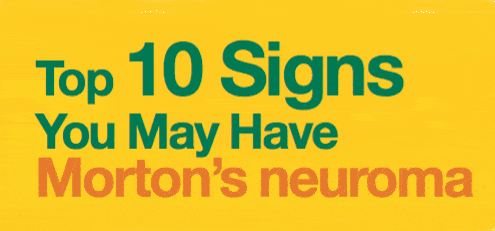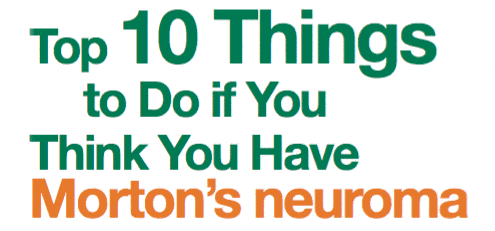Do you sometimes feel like there’s a rock inside your shoe when you’re walking? But when you check to see what’s causing the discomfort, you can’t find any rock or pebble. If this sounds familiar, you might have a condition called Morton’s neuroma.
Morton’s neuroma happens when a tissue thickens around the nerves leading to your toes. You might feel a sharp, burning pain in the ball of your foot, especially in the area between your third and fourth toes, where Morton’s neuroma most often occurs.
If you’re tired of dealing with the pain and discomfort caused by Morton’s neuroma, The Center For Morton’s Neuroma can provide the solution for you. We specialize in Morton’s neuroma and offer specialized products and procedures for patients suffering from Morton’s neuroma. Our experienced doctors and staff will work closely with you to develop a treatment that will help improve your condition.
Morton’s neuroma is often the result of wearing shoes that are too tight or shoes with high heels. Other possible reasons are gait defects that might cause stress on the nerves on the foot. Some examples of these defects are: Flat Feet, High-Arched Feet, Bunions and Hammertoes.
Morton’s Neuroma is more likely to occur in women who wear high-heeled shoes for long periods. Athletes are also prone to having Morton’s neuroma if their sport involves high-impact activities with intense “stop-start” movements. Some sports require players to wear tight, constricting shoes that put pressure on the toes as well.
Morton’s neuroma has no visible signs such as lumps or swelling. Patients who have Morton’s neuroma often find out through the slight tingling or pain they feel between their toes. Although there are cases when people don’t always feel the symptoms of Morton’s Neuroma, others are in constant pain and discomfort. Some of the most common symptoms of Morton’s neuroma are:
Treatment for Morton’s neuroma depends on the seriousness of a patient’s symptoms. Your doctor might suggest that you start on simple first line nonsurgical treatments before moving on to procedures if the pain on your foot persists. Initial treatment for Morton’s neuroma usually involves:
Do you feel some, if not most, of the symptoms listed above? Or do you know someone who does? If you’re looking for treatments for Morton’s neuroma that doesn’t require surgery, The Center For Morton’s Neuroma is the perfect place for you. We offer a wide range of nonsurgical procedures to help treat Morton’s neuroma.
Our team is committed to providing you with a comprehensive treatment that we pattern to your medical history and lifestyle. We will be your partner in getting your life back from the pain caused by Morton’s neuroma. Contact us today to find out more about how our services can help you

We specialize in the treatment of Morton’s neuroma and have the widest range of effective non-surgical options for the treatment of Morton’s neuroma available.
 We will develop a complete multi-disciplinary treatment plan to best treat your Morton’s neuroma (or Plantar Fasciitis.) We do not have a cookie cutter approach. Our philosophy is to treat your Morton’s neuroma with the most appropriate non-surgical treatment for you and only resort to surgery as a very last option.
We will develop a complete multi-disciplinary treatment plan to best treat your Morton’s neuroma (or Plantar Fasciitis.) We do not have a cookie cutter approach. Our philosophy is to treat your Morton’s neuroma with the most appropriate non-surgical treatment for you and only resort to surgery as a very last option.
Any surgery carries certain risks and so we offer a broad range of ultrasound guided procedures, which we can exhaust before recommending surgery. However we will recommend surgery if all non-surgical approaches have been exhausted or are inappropriate.
Don’t let Morton’s Neuroma interfere with your daily routine. At The Center For Morton’s Neuroma, we specialize in non-surgical treatments for foot neuromas. There are a wide range of treatments and procedures which can be used to treat Morton’s Neuroma. However, each individual responds differently to certain kinds of treatment. That is why we carefully evaluate your foot pain, make a diagnosis and plan before deciding on the best approach to treat your Morton’s Neuroma. Here are some of our treatments:
This minimally invasive treatment makes use of extremely cold temperatures to target nerves affected by Morton’s Neuroma. This procedure is done by using liquid nitrogen or argon gas in order to freeze and destroy tissues affected by Morton’s Neuroma.
This treatment makes use of high-frequency radio waves which target nerves affected by Morton’s Neuroma. The heat emitted by these radio waves breaks down proteins which prevents nerve fibers from transmitting pain.
This treatment involves injecting a neurolytic agents like concentrated alcohol into the affected tissue. This eliminates or at least significantly decreases the ability of the nerves to transmit pain signals, thereby causing significant pain relief.
We usually combine this with an ultrasound guided ablation. PRP involves harnessing your body’s natural ability to regenerate itself in order to promote the healing of injured tendons, ligaments, muscles and joints. Platelet Rich Plasma is taken from a sample of your own blood, which is then centrifuged it to concentrate the platelets then injected into the damaged tissues.
Our custom-designed orthotics will help you with your biomechanical foot issues such as problems with walking and running. We offer two types of designs that ensure maximum comfort and rigidness for your feet. You can choose from Comfort or Support Orthotics.
Corticosteroid Injections can be used for temporary pain relief. This should used rarely due to its adverse effects which may include fat pad atrophy and weakening of the muscles and ligaments which could lead to further foot pain and instability.
Through this therapy, stem cells from the bone marrow are used in order to repair and rebuild the tissues damaged by Morton’s Neuroma. This is done by collecting stem cells from your pelvic bone, and injecting them into the affected body part.
This treatment transmits pressure waves onto the affected area through the use of Extracorporeal Pulse Activation Technology. These waves help stimulate metabolism, enhance blood circulation, and accelerate the healing process.
Don’t wait for your condition to get worse, contact The Center For Morton’s Neuroma today. We are committed to providing our patients with the most appropriate non-surgical treatments for their Morton’s Neuroma. To know more about our products and services you can call us at (774) 42]1-9144 or email us at [email protected].


By providing us with your information you are consenting to the collection and use of your information in accordance with our Terms of Service and Privacy Policy.